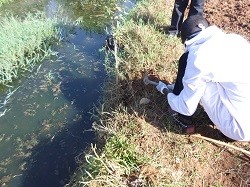ICT solutions for the detection of superbugs
Multidrug-resistant microorganisms – also called superbugs – constitute an important source of hospital-acquired infections, which increase the health burden of patients and associated costs. They are very difficult to eradicate despite increasing antibiotic consumption, necessitating alternative formulations. According to WHO(opens in new window), over 250 antimicrobial agents are in early-stage testing, and unfortunately, many candidates will fail along the way. With respect to antibiotics, only a fraction of new molecules will successfully pass preclinical development and reach the market.
Instigating the industry to develop ICT solutions
To support the laborious fight against antimicrobial resistance, it is necessary to buy some time until treatment innovations are available. The EU-funded ANTI-SUPERBUGS PCP(opens in new window) project supports this concept and proposes the development of ICT solutions that can assist in surveillance and prevention. “Our mission was to launch a pre-commercial procurement (PCP) to instigate the industrial development of smart ICT solutions for superbug detection,” explains project coordinator Rossana Alessandrello. These ICT solutions must give real-time feedback to the user and, at the same time, share the information with healthcare electronic record systems and link the infection with the place of the detection. The European consortium consisted of a buyers’ group made of healthcare providers and local infections surveillance authorities supported by knowledge players experienced in ICT solutions for superbugs detection, pre-commercial procurement and health innovation assessment. They wished to address challenges associated with sample collection, the turnaround time and the non-invasiveness aspect of detection. The key objective was to support and finance research and development activities towards advanced ICT solutions and services in healthcare. The consortium formed a pan-European network of procurers and served as a hub for learning, sharing and transferring knowledge and technologies across different fields.
Tender submission for ICT solutions procurement
A request for tender(opens in new window) was established for the development and testing of prototypes of devices and ICT services that can non-invasively test for the presence of superbugs in the hospital environment such as Clostridium difficile, MRSA and Klebsiella pneumoniae. The AQuAS, Agency for Health Quality and Assessment of Catalonia(opens in new window) was appointed as the lead procurer to coordinate and lead the joint procurement and to sign the specific contracts for all phases on behalf of the buyers’ group. The contractors underwent a competitive process divided into phases to deliver their pre-commercial solutions addressing the buyers’ common unmet needs. The call allowed interested economic operators to build up consortia to come up with relevant and competitive offers. Phase 1 involved the design of an ICT solution, and phase 2 the prototyping. Phase 3 contractors were required to prepare a pre market clinical proof-of-concept proposal authorised by the relevant ethical committees for testing their technological solutions. All valid tender submissions were evaluated by an experts panel against the criteria stated in the initial invitation. The total joint procurement budget was divided depending on the phase of the call, while buyers co-invested 30 % of the funding. The Phase 3 Sense4Care and Bugwatcher contractors tested the capability of their prototypes at different consortium facilities and successfully increased the maturity of their technologies. The ANTI-SUPERBUGS PCP solutions are expected to improve the quality-of-care processes in hospitals and reduce both the cost and operational impact caused by multidrug-resistant infections. With a view to the future, Alessandrello concludes: “Project results and generated knowledge have the potential to transform current surveillance and infections control systems and optimise antimicrobials usage.”







